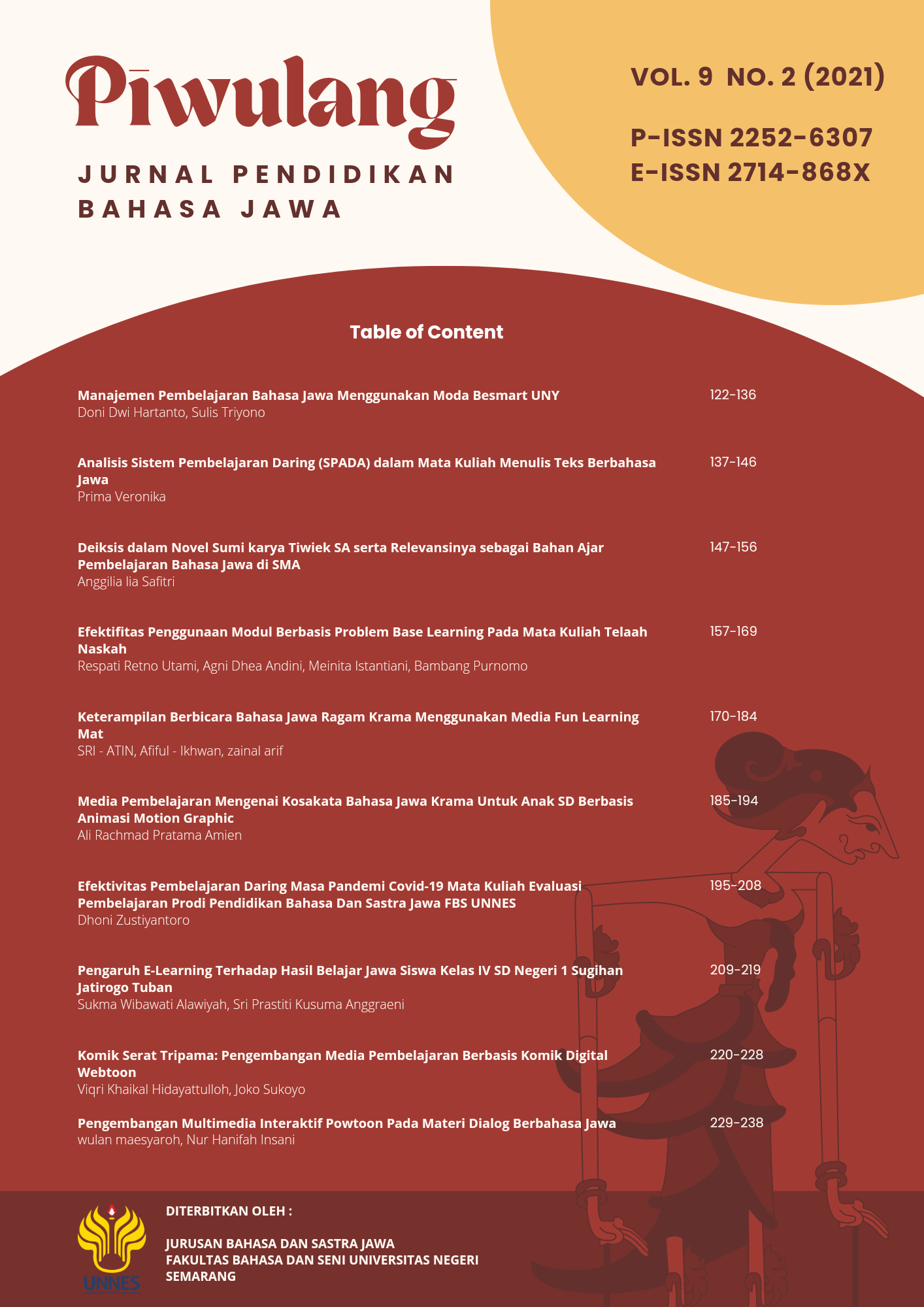Efektifitas Penggunaan Modul Berbasis Problem Base Learning Pada Mata Kuliah Telaah Naskah
##plugins.themes.academic_pro.article.main##
Abstract
This study aims to determine the effectiveness of using Problem Based Learning-based modules in the text review course. This study took a sample of 4th semester students of class A class A, Regional Language and Literature Department, State University of Surabaya. The research method used is descriptive quantitative method. Data collection techniques were carried out by distributing questionnaires, observations, and giving test questions for cognitive learning outcomes. The data analysis technique was carried out with One Group Pretest-Posttest Design, then the data was tested using the normality test and T-Test (Paired Samples T-Test). The results showed that the Problem Based Learning-based module was effectively used in the manuscript review course. This is evidenced by the progress of the average score from pretest to posttest, namely from 64.1034 to 73.5517. The minimum score in the pretest is 50.00, with the maximum score being 78.00. It is different with the posttest, the minimum score achieved by students is 60.00 and the maximum score is 85.00. On the basis of these advances, the Problem Based Learning-based module is effective for improving students' understanding and skills in the text review course.
##plugins.themes.academic_pro.article.details##
References
Arikunto, S. (2010). Prosedur Penelitian Suatu Pendekatan Praktik. Jakarta: Rineka Cipta.
Aryani, I. (2017). Efektivitas penggunaan modul pembelajaran pada mata kuliah ekologi hewan materi populasi hewan. In Seminar Nasional Pendidikan Sains II UKSW (pp. 41-47).
Barrows, H.S., & Tamblyn, R.M. (1980). Problem Based Learning in secondary education and the Problem-based Learning Institute (Monograph). Springfield: Southern Illinois University School of Medicine.
Duch, B. J., Groh, S. E., & Allen, D. E. (2001). Why problem-basedd learning? A case study of institutional change in undergraduate education. In B. Duch, S. Groh, & D. Allen (Eds.), The power of problem-basedd learning (pp. 3-11). Sterling, VA: Stylus.
Festiana, I., Sarwanto., dan Sukarmin. (2014). Pengembangan Modul Fisikaberbasis Masalah pada Materi Listrik Dinamis untuk Meningkatkan Kemampuan Berpikir Kreatif Siswa SMA. Jurnal Inkuiri. ISSN: 2252-7893, 3(2), 36-47.
Hmelo-Silver, C. E. (2004). Problem-basedd learning: What and how do students learn? Educational Psychology Review, 16(3), 235-266.
Hmelo-Silver, C. E. , & Barrows, H. S. (2006). Goals and Strategies of a Problem-basedd Learning Facilitator. Interdisciplinary Journal of Problem-Basedd Learning, 1(1). Available at: http://dx.doi.org/10.7771/1541-5015.1004
Hurlbut. A. R., (2018) Online vs. traditional learning in teacher education: a comparison of student progress, American Journal of Distance Education, 32:4, 248-266, DOI: 10.1080/08923647.2018.1509265
Kurniawan, Agung Widhi. (2016). Metode Penelitian Kuantitatif. Yogyakarta: Pandiva Buku.
Muri, Yusuf. (2014). Metode Penelitian: Kuantitatif, Kualitatif, dan Penelitian Gabungan. Jakarta: Kencana.
Murwati, Eni. (2018). Serat Centini dalam Masyarakat Jawa (Tinjauan Resepsi Sastra), Metalingua, 3 (1), 27-38
Nurhayati, Endang, Mulyani, Hesti, E, Venny Idria. (2018). Dunia Manuskrip Jawa teori, Metode, dan Aplikasinya dalam Praktik Pernaskahan Jawa. Yogyakarta: cantri Pustaka.
Purnomo, Bambang, (2016). Filologi dan Studi Sastra Lama (Sebuah Pengantar Ringkas). Surabaya: Penerbit Bintang Surabaya.
Rasheed, R. A., Kamsin, A., & Abdullah, N. A. (2020). Challenges in the online component of blended learning: A systematic review. Computers & Education, 144, 103701.
Rohmawati, A. (2015). Efektivitas pembelajaran. Jurnal Pendidikan Usia Dini, 9(1), 15-32.
Savery, J. R. (1999). Enhancing motivation and learning through collaboration and the use of problems. In S. Fellows & K. Ahmet (Eds.), Inspiring students: Case studies in motivating the learner (pp. 33-42). London: Kogan Page.
Savery, J. R. (2006). Overview of Problem-basedd Learning: Definitions and Distinctions. Interdisciplinary Journal of Problem-Basedd Learning, 1(1). Available at: http://dx.doi.org/10.7771/1541-5015.1002
Steinwachs, B. (1992). How to facilitate a debriefing. Simulation & Gaming, 23(2) 186-195.
Suarsana, I. M., dan Parwati, N.Y. (2007). Pengembangan Modul Teori Bilangan Berorientasi Penalaran dan Pemecahan Masalah untuk Mengembangkan Kompetensi Berpikir Tingkat Tinggi Mahasiswa. Singaraja: Undiksha.
Sugiyono. (2017). Metode Penelitian Pendidikan. Bandung: Penerbit Alfabeta.
Tsai, C. W., & Chiang, Y. C. (2013). Research trends in problem‐basedd learning (PBL) research in e‐learning and online education environments: A review of publications in SSCI‐indexed journals from 2004 to 2012. British Journal of Educational Technology, 44(6), E185-E190.
